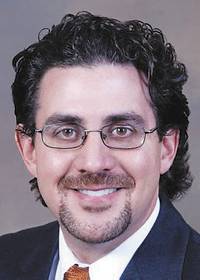Related content
In the late 1990s and early 2000s, Southern Nevada’s Hispanic business community was growing exponentially.
A surge in the Latino population, paired with Las Vegas’ booming economy, created new demand and a new market for businesses catering to Hispanics. At the same time, a new wave of Hispanic entrepreneurs, traditionally underrepresented among the ranks of business owners, stepped in to meet the growing valley’s needs.
Then, the Great Recession hit and derailed the economy, crushing many businesses with it. Small companies owned by Latinos were especially hard hit.
Now, as the region staggers toward a recovery and better times appear to be on the horizon, a new generation of young, educated and entrepreneurial Hispanics have stepped up, poised to take the reins of the business community.
“We have a whole cadre of students who are now becoming lawyers, accountants and doctors,” said Latin Chamber of Commerce President and CEO Otto Merida. “The children of (first-generation Hispanics) are becoming professionals. They’re becoming entrepreneurs. We are seeing Hispanic businesses coming alive again, and hopefully in the next two or three years, we pick up where we left off.”
Over the next decade, leaders and economists expect the Hispanic business community to diversify, with more people entering white-collar professions and starting their own businesses. Key sectors are expected to be outside of manufacturing and the service industry, which currently make up the bulk of Hispanic-owned businesses.
Eventually, the Hispanic business community will be indistinguishable from the broader business community, as was the case with immigrant European business owners in the 20th century, said Gus West, president of The Hispanic Institute, a nonprofit organization that studies Hispanic contributions to the economy.
“A couple of decades out, the percentages of Hispanic-owned businesses will correlate with the size of our population,” West said. “The question is: how fast will it happen?”
Growth in Southern Nevada’s Hispanic business community has been fueled largely by demographics. The state’s Latino population has more than doubled since 1990, growing from 10.4 percent to 26.6 percent.
The population explosion was mirrored by similar growth in the number of Hispanic-owned businesses, which increased in Nevada from 9,741 to 18,029, according to the most recent U.S. census data. Today, Latinos own 8 percent of all businesses in the state. The census defines Hispanic-owned businesses as any in which 51 percent or more of the company is held by an individual of Hispanic or Latino origin.
“That was the fastest growing segment of our local population,” said Jeremy Aguero, principal analyst at Applied Analysis. “There was natural room for growth as those populations reached critical mass and entrepreneurs sprung up like they would in any community.”
Hispanic-owned businesses traditionally have been concentrated in the construction, maintenance and services industries. They began to diversify as the population grew.
But the 2008 economic crash drove off many Southern Nevada residents, especially Latinos, and the Hispanic community saw a major slow down in the growth of its businesses, Aguero said.
With the population beginning to increase again, young Hispanic entrepreneurs will have new opportunities, Aguero said. The number of Hispanics in Clark County is expected to grow by 156,300 people by 2020, accounting for two thirds of the state’s total expected population gain.
“There’s another generation of Hispanic Southern Nevadans that are just now coming into their own,” Aguero said. “These are second- and third-generation folks whose parents worked very hard to give them a better life. They are more educated than their parents were. They’re more entrepreneurial than their parents were.”
Younger Latinos entering the workforce also have several advantages over their parents, including bilingual skills and a greater familiarity with technology. Both areas have traditionally posed challenges for Hispanic business owners.
“I think some of the challenge for many small Hispanic businesses is to embrace new technologies from the 21st century, meaning social media or new procedures internally, like inventory control technologies,” said Marcel Schearer, director of the Imagine 2020, an initiative sponsored by the Nevada Small Business Development Center aimed at supporting and growing business diversity.
Access to bank loans and other financial services has also traditionally been limited in the Hispanic community, for cultural reasons and because many Latinos lacked the credit history and paperwork they needed, said Tony Timmons, Nevada spokesman for Wells Fargo Bank and a director at the Las Vegas Latin Chamber of Commerce.
“It was an immigrant population or a low-skilled population that typically didn’t fully utilize banking services,” Timmons said. “When you actually go down to Mexico, the economy is cash-based, but that’s starting to change.”
Timmons said Southern Nevada is at a “key pivot point generationally,” and banks are working with schools to teach young people about the importance of savings, how to manage a budget and how to build credit.
Many younger Latinos will have the opportunity to take over family businesses started by their parents and grandparents, Timmons said. They’ll have to decide whether to grow the companies or take them in new directions.
Merida, the Latin Chamber president, predicted that international trade will be an important avenue through which businesses can expand. He cited a local Hispanic-owned recycling company and automotive tools manufacturer as examples of businesses already having great success exporting.
“International trade is an area we can really expand to be able to export things we manufacture here in Southern Nevada,” Merida said. “I see an expansion of businesses into Central America and South America, with more diversification and more exports.”
The chamber is reaching out to existing businesses to help them explore expansion into international markets.
“A lot of the businesses that are already here didn’t know how to get involved,” Merida said.
And while Hispanic small businesses face some unique challenges, Merida said he’s confident the community, led by its younger generation, will grow and ultimately thrive.
“We are very optimistic that things will get better,” Merida said. “I have been in Southern Nevada since 1974. I believe we’re very resilient. We’re going to reinvent Nevada once again, with Hispanics being a much bigger part than before. In years past, we were followers. Now we’re going to be leading the way.”


